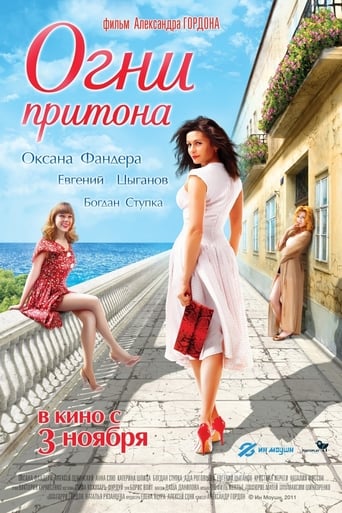



Best movie of this year hands down!
The movie's neither hopeful in contrived ways, nor hopeless in different contrived ways. Somehow it manages to be wonderful
View MoreExcellent and certainly provocative... If nothing else, the film is a real conversation starter.
View MoreA great movie, one of the best of this year. There was a bit of confusion at one point in the plot, but nothing serious.
View MoreA film about the life and tribulations of "Mama" Lyuba, who keeps a small brothel in sunny Odessa in the late 1950s. Her relationship with men is difficult, as is to be expected. A young man who is eager to get rid of his virginity has a crash on her, and although she treats him well, she can't take him seriously. She often goes to relax and sunbathe by the seaside, where she befriends Adam, a madman traumatised by WWII, a holy wise fool, a prophet, in the Russian tradition. Adam's horizons are much broader than Lyuba's, and she grows fond and protective towards him, to the point where she starts dreaming of a life with him. As for Adam, he seems to enjoy Lyuba's company, the bottle of wine they share and the little money she gives him every now and then.In her search for a change for the better in her life, Lyuba sometimes visits her mother's house in her native village, and even tries to settle down there. However, she is rejected both by her mother, whose greeting is "The prostitute has arrived" and particularly by the villagers, who fail to defend her when she is beaten up by a young man whose rough assault she had stopped. In her village she is more lonely and defenseless than in the brothel.The two main roles, Lyuba and Adam, are very well carried through. Their relationship is a bit more hard to believe. Oksana Fandera, who plays Lyuba, is stunning throughout the film; perhaps too stunning, given her profession. The village scenes come close to being stereotypes.Beautiful colours and beautiful light in the film. When storms come along, the rain is also exquisitely filmed. Much attention paid to detail. Ultimately, a nostalgic film full of light with a dramatic background.
View MoreAs much as I value Alexander Gordon's TV shows and appreciate his role in promoting Russian art house movies, this film was a disappointment, mainly because Gordon lacks talent to be a movie-maker. His film lackes emotions, style and the main idea. Naturally, "Brothel Lights" is a manifestation of the director's personality, bearing part of his inner self. While the main features of Gordon's personality – intellect, sarcasm, sophistication – have to be credited with helping him to create impressive shows and exciting TV debates, they had an adverse effect on what was apparently meant to be a deeply emotional and existentialistic drama. Director's cold intellect and his chess grandmaster's posture were of no avail to give insights into the tragedy of the protagonist, Mamma Liuba (Oxana Fandera), so what could be expected of the audience? You need heart to empathize to characters, and you need a much bigger heart to make viewers empathize to them. Mere reasoning, however logical and critical, won't do it. The story lacks veracity and persuasiveness. In the 1950s Odessa, Mamma Liuba, a charming and smart woman in her 40s, is running a boutique underground brothel. She's getting tired of the business hassles and dreaming about meeting a man she'll love and having a family. A talented guy, half her age, has a crash on, but a crash is not what she needs. Finally the destiny gives her a chance in the form of an intelligent alcoholic prophet suffering from personality disorder (Adam, Alexey Levinsky's part). She makes up her mind to shut down the brothel and goes to her home village to see her mother. To her dismay she finds out that the stigma will haunt her forever: People call her "a whore" and turn their backs on her. Devastated, she returns to Odessa, kicks out the last visitors from the brothel, lies down on a bed and dies. Why does Momma Liuba leave this world? What precludes her from going ahead with her plans and living with Adam? The scorn displayed by fellow villagers is not a convincing reason. Aside from the village, she enjoyed respect elsewhere after all. These questions unanswered, the movie becomes a belated parody of "Nights of Cabiria." Gordon loves to stigmatize his TV show guests – novice film-makers – with a blow off statement, "I didn't understand what audience segment your movie targets." This is exactly what "Brothel Lights" can now be accused of, for Mr Gordon himself had no clue as to who would want to watch his work. The film is not sufficiently sophisticated, experimental or profound for art house fans. On the other hand, it's not simplistic enough or financed well enough to appeal to the mainstream audience. I suppose Gordon's work reaches out to those who appreciate the legacy and spirit of the old Odessa, but I doubt this was his main motivation to make the movie (although it may have been for the script writer and his father, Gary Gordon, who grew up in Odessa). What Gordon managed to prove is that he is as much meaningless directer as he is a meaningful critic. If Gordon had any artistic honesty, he would have to stop trying to persuade the audience that he's capable of making movies work as opposed to whining about the lack of decency in the modern Russian cinema. The only positive point that ought to be mentioned here is solid acting. Unfortunately it did not save the show. 3/10
View More